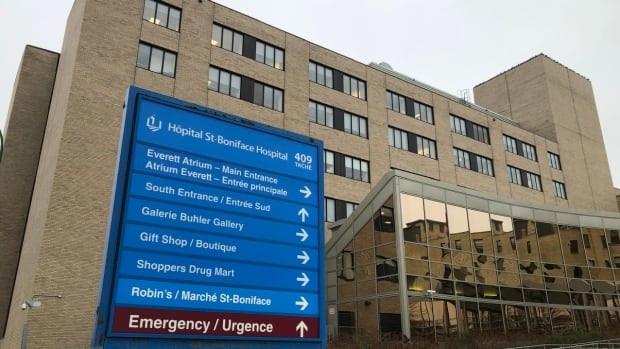
An in-patient wielding knives in a medical unit at St. Boniface Hospital prompted a response from the Winnipeg tactical support team on the weekend.
The man was acting erratically but the situation was de-escalated by security and staff and police were called, says a St. Boniface Hospital memo obtained by CBC.
“It becomes something that can be anxiety inducing,” said Dr. Noam Katz, a doctor in the ER of St. Boniface Hospital. “It affects really everybody involved, whether or not they were present.”
The patient was a man in distress and the matter was handled by officers, with no injuries reported, the Winnipeg Police Service wrote in a statement sent to CBC News. No charges have been laid.
Katz said while there have been some security improvements at hospitals in the city, more can be done to deal with increasing rates of weapons and violence at the hospital.
“There’s a lot of conversations about drastic measures, like adding metal detectors at entrances,” said Katz. “But that is certainly something that I don’t think anybody wants to jump to.”
While metal detectors may decrease some anxiety around weapons in the hospital, they are a double-edged sword, with potential to make the hospital feel unsafe for patients walking through the door who need care, he said.
“We already know that many of those people are already having the worst day of their lives,” Katz said.
“Adding another element like that [metal detectors] may be more problematic than otherwise.”
Hospital staff train for potential violent situations, but Katz said it’s scary to have to have codes for violence and run live shooter drills.
“I think it’s very easy to see yourself being impacted directly from a situation like this.”
‘No way to know’
Darlene Jackson, president of the Manitoba Nurses Union, said incidents of weapons and violence in hospital medical units are more common than the public realizes.
“There is violence in the workplaces in every unit in every facility in this province,” Jackson said.
“Patients, staff, nurses are at risk in every one of our facilities and every unit because there is no way that we have of checking that patients have weapons.”
This past summer, Health Sciences Centre installed an AI weapons detector at the entrance to the emergency department as part of a new pilot project to address weapons being brought into HSC.
The trial is being modelled after what’s done at Windsor Regional Hospital, where there’s an Evolv system. Manitoba Shared Health said a few companies participated in the pilot, but they all share similar technology.
Jackson said the union hasn’t yet heard from Shared Health about the outcomes of the HSC trial.
It’s the responsibility of the province and the employer, not staff, to solve and mitigate issues of violence at hospitals, Jackson said.
“It would be very interesting to know, was a pilot project successful?” Jackson said.
“Will that be expanded to other areas of the hospital, the main entrances?”
St. Boniface Hospital is under the jurisdiction of the Winnipeg Regional Health Authority, while HSC is operated under Shared Health Manitoba.
An email from the Winnipeg Regional Health Authority confirmed what the hospital memo said about the incident, and thanked both the unit staff and SBH Protection Services for de-esalating the situation and ensuring no one was hurt.
Both St. Boniface Hospital leadership and Winnipeg police are investigating, the email said.
The WRHA has hired and completed training for 16 institutional safety officers at St. Boniface Hospital, who will begin working soon, the email said.